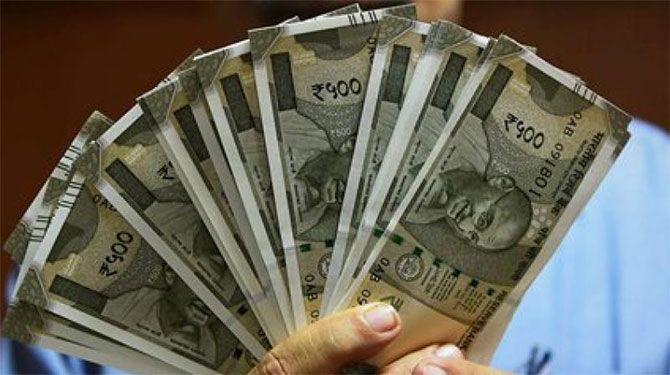In the second of a four-part series, Shashikant Trivedi/Business Standard checks out the currency press in Dewas, Madhya Pradesh, to find target-based allowances have increased the monthly salary of employees from Rs 10,000 to Rs 30,000, at a time when currency notes are being printed 24x7.
Part 1: When did printing of Rs 2,000 notes actually begin?

The Dewas mint is looking at a target of at least 18 million pieces of the new 500 denomination notes per day soon. Photograph: PTI Photo.
Like most others, workers of Bank Note Press Dewas (BNP Dewas) have been coping with banks and automated teller machines running out of cash, after demonetisation. In this case, it’s ironical because an ATM located inside the BNP Dewas complex has also failed to give out cash to the people busy printing currency notes through three round-the-clock shifts.
Dewas, an ancient town in Madhya Pradesh (MP), 35 km from Indore, is abuzz with daily unconfirmed updates on the number of pieces of currency notes being printed at the press. Sources said the current situation is so demanding that the management has asked workers to motivate retired employees to rejoin BNP, so that government targets of printing sufficient currency notes are met.
“It requires special skill, and fresh recruitments will not be a good idea at this crucial hour. So, BNP needs the retired workers,” said sources in Security Printing and Minting Corporation of India (SPMCIL), the parent company of BNP Dewas.
BNP General Manager M C Velappa, when contacted, refused to divulge any detail.
“There are around 400 retired workers in Dewas and the vicinity. We can gladly motivate them for a come-back but only under 63-years could be redeployed. As a result, only 10-15 might have applied and have rejoined,” said L N Maru, district secretary of the Bharatiya Mazdoor Sangh. In fact, SPMCIL top officials are learnt to have held talks with the local workers a few days ago on how to cope with the current situation.
The management here is looking at a target of at least 18 million pieces of 500 denomination currency per day soon, up from the current figure of 12 million pieces a day. While the earlier commitment given in September was to print 1,000 million pieces of Rs 500 notes by December, the authorities have more than doubled the numbers now. The new targets could be 2,600 million pieces by year-end.
The printed currency is airlifted through air force planes, so that more than 4,000 currency chests across India can be replenished. Typically, airlifting happens from Indore, the commercial capital of MP.
Incentives are being given to workers for printing 12 million pieces of Rs 500 denomination a day, which is seen as a record. While the daily allowance is pegged at Rs 250, there’s a target allowance too -- beginning at Rs 50 per million pieces and then the amount goes up with the altering threshold. For instance, it would be Rs 150 per million, if more than 360 million pieces are printed.
Along with target incentives and allowances, the minimum that an employee is getting is Rs 40,000 a month. Retired workers, if they join, will get around Rs 50,000 per month.
A technician at the currency press called it a “national emergency’’, and pointed out that his take-home has touched Rs 70,000 a month now. Productivity-linked allowances are adding at least Rs 10,000-15,000 to the monthly pay package of workers, and Rs 20,000-30,000 to supervisors, managers and other seniors.
The BNP was corporatised in 2006 and two years later, a special voluntary retirement scheme was introduced. As many as 400 workers opted for it and an equal number absorbed in other government jobs.
“Only 1,175 were left. Little did we know we’d become important overnight,” Maru quipped.
Meanwhile, the locals say the town should be given priority in cash exchange. “Ironical that a town that prints currency does not have enough to pay its daily-wagers,’’ said Ashok Khandelia, president, Dewas Industries Association.
Previous: Salboni, West Bengal











